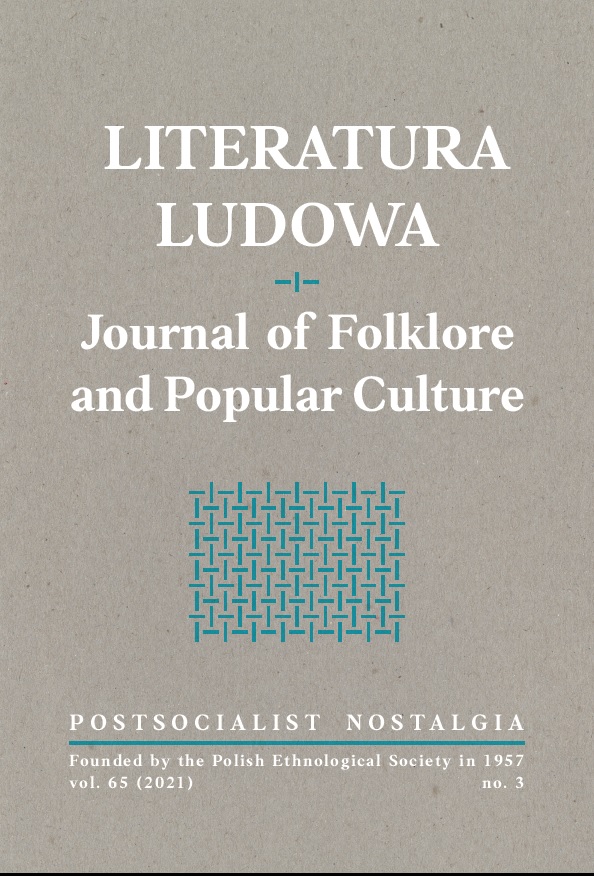Imperative nostalgia: Russian science fiction novels about moving to the 1970s USSR
DOI:
https://doi.org/10.12775/LL.3.2021.003Keywords
nostalgia, late socialism, time-travel, science fiction, fantastic historical novel, myths about the USSRAbstract
The article examines selected novels by Russian science fiction writers concerning the transition of heroes in the 1970s of the Soviet Union. These novels began being published quite recently, mostly by the authors themselves. The article formulates the differences between such works and similar fantastic historical novels: the hero’s arrival into his own era, the absence of the motive of “reviving history”, etc. The analysis of the novels allows us to conclude that this particular image of the bygone Soviet era is built by not only describing real historical events, but also using myths and stereotypes concerning the USSR. Nostalgia for late socialism permeates the novels, while calls for the restoration of the Soviet Union are already formulated in the very titles. Accordingly, another kind of nostalgia stands out – an imperative one with the following features: the absence of a utopian image of a bygone time; an active character, which makes the nostalgic feeling the opposite of the elegiac one. This imperative nostalgia based on myths and stereotypes is shared by readers who see Perestroika as a human catastrophe that destroyed the “wonderful world”. In addition, they are close to the conversational aggressive style with which the novels are written, as well as the image of a self-righteous hero. Imperative nostalgia reflects the needs for the restoration of the Soviet Union that have formed in modern society.
References
Абашева, М. П., Литовская, М. А., Савкина И. Л., Черняк М. А. (ред.) (2020). Культ-товары. Коммерциализация истории в массовой культуре. Москва–Екатеринбург: Кабинетный ученый.
Алданов, М. (1993). Собрание сочинений. В 6. Т. 3. Москва: Пресса.
Бойм, С. (2013). Будущее ностальгии. Неприкосновенный запас, 3, 118–139.
Василевский, Л. М. (1924). К здоровому половому быту. Москва: Новая Москва.
Викторов, Э. (2009). Последняя сексуальная революция в советском обществе. Вопросы культурологии, 12, 54–58.
Воробьева, М. В. (2008). Анекдот как феномен повседневной культуры советского общества (на материале анекдотов 1960–1980-х годов) [автореф. канд. Культурологии]. Екатеринбург: Уральский университет.
Горин, Д. (2007). „Конец перспективы”. Переживание времени в культуре 1970-х. Неприкосновенный запас, 2, 111–122.
Дроздов, А. (2020). Реваншист. [Б. м.]: 1С-Паблишинг.
Емелин, С. М. (2019). Социальная политика в отношении инвалидов в СССР после Великой Отечественной войны. Проблема соблюдения прав человека и идеологической целесообразности. Вестник ВЭГУ, 2(100), 59–70.
Карасев, Л. (2007). 1970-е как переживание. Неприкосновенный запас, 2, 243–251.
Козьмина, Е. Ю. (2017). Фантастический авантюрно-исторический роман. Поэтика жанра. Москва–Екатеринбург: Кабинетный ученый.
Кольцов, М. И. (2013). Серийные убийства в истории советского и российского уголовного правоприменения. Вестник ТГУ, 1(117), 325–330.
Королюк, М. (2014). Спасти СССР. Инфильтрация. [Б. м.]: Альфа-Книга.
Липовецкий, М., Михайлова, Т. (2021). Больше, чем ностальгия (Поздний социализм в телесериалах 2010-х годов). Новое литературное обозрение, 169, 127–147.
Синявский, А. (2003). Литературный процесс в России. Литературно-критические работы разных лет (сост. М. В. Розанова). Москва: РГГУ.
Тамарченко, Н. Д. (2008). Историческое время. В: Тамарченко Н. Д., Поэтика. Словарь актуальных терминов и понятий (с. 88-89). Москва: Издательство Кулагиной, Intrada.
Тамарченко, Н. Д., Тюпа, В. И., Бройтман, С. Н. (2004). Теория литературы. В 2. Т. 1. Москва: Академия.
Фефелов, В. (1986). „В СССР инвалидов нет!” London: Overseas Publications Interchangе.
Щепетнов, Е. (2020). 1972. СОЮЗ нерушимый. [Б. м.]: Щепетнов Евгений.
Эдельман, О. (1999). Легенды и мифы Советского Союза. Логос, 5, 5–15.
Юрчак, А. (2014). Это было навсегда, пока не кончилось. Последнее советское поколение. Москва: Новое литературное обозрение.
Downloads
The publisher's shop:
Published
Versions
- 2023-04-07 (2)
- 2021-12-23 (1)
How to Cite
Issue
Section
License

This work is licensed under a Creative Commons Attribution-NoDerivatives 4.0 International License.
1. The authors give the publisher (Polish Ethnological Society) non-exclusive license to use the work in the following fields:a) recording of a Work / subject of a related copyright;
b) reproduction (multiplication) Work / subject of a related copyright in print and digital technique (ebook, audiobook);
c) marketing of units of reproduced Work / subject of a related copyright;
d) introduction of Work / object of related copyright to computer memory;
e) dissemination of the work in an electronic version in the formula of open access under the Creative Commons license (CC BY - ND 3.0).
2. The authors give the publisher the license free of charge.
3. The use of the work by publisher in the above mentioned aspects is not limited in time, quantitatively nor territorially.
Stats
Number of views and downloads: 281
Number of citations: 0



